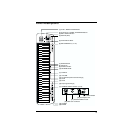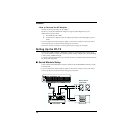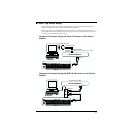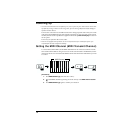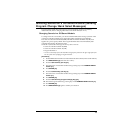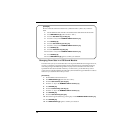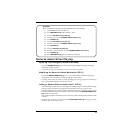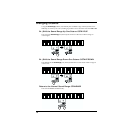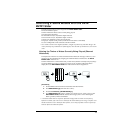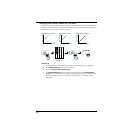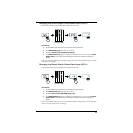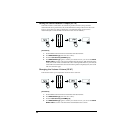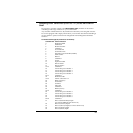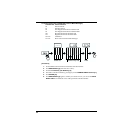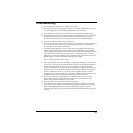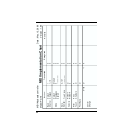
17
Controlling a Sound Module with the DATA
ENTRY Slider
The following functions can be assigned to the DATA ENTRY slider:
Function nameDescription
Channel Aftertouch Alters notes currently being played
VelocityChanges dynamics
Reverb Send Level (CC 91)Sets the depth of Reverb
Chorus Send Level (CC 93)Sets the depth of Chorus
Volume (CC 07)Sets the volume level of the Part
Panpot (CC 10)Sets sound position (localization in the stereo sound field)
CC 00 to 127Depends on the selected Controller Number
* Since a slider control accesses digital information, it might not produce any noticeable change in the
value if moved by only a small amount. If this happens, move the slider up and down once, then set the
value.
Altering the Timbre of Notes Currently Being Played (Channel
Aftertouch)
The keyboard on the PC-70 cannot transmit Channel Aftertouch messages. However, such
messages can be transmitted by assigning the Channel Aftertouch function to the DATA
ENTRY slider on the PC-70.
Channel Aftertouch is a function that lets you alter notes (that have already been played) by
applying additional pressure on the keys. The PC-70 can create this Aftertouch effect—
simply move the DATA ENTRY slider after Aftertouch has been assigned to it.
fig.aftertouch.e
[Procedure]
1. Set the MIDI transmit channel to match that of the desired Part.
2. Press MIDI/SELECT [3] (LED will show “SEL”).
3. Press the F3 white key (AFTER TOUCH) [7].
4. Press MIDI/SELECT [3] again to confirm your selection. Now, when you move the
DATA ENTRY slider, Channel Aftertouch messages (with a value reflecting the
slider’s position) will be transmitted.
* A GS sound module will not respond to Aftertouch messages while it remains set at its factory
defaults. For details, refer to the owner’s manual for the sound module you are using. Computer users
should consult the owner’s manual for their software, since it may be possible to select a response for
Channel Aftertouch within the software.
Aftertouch



